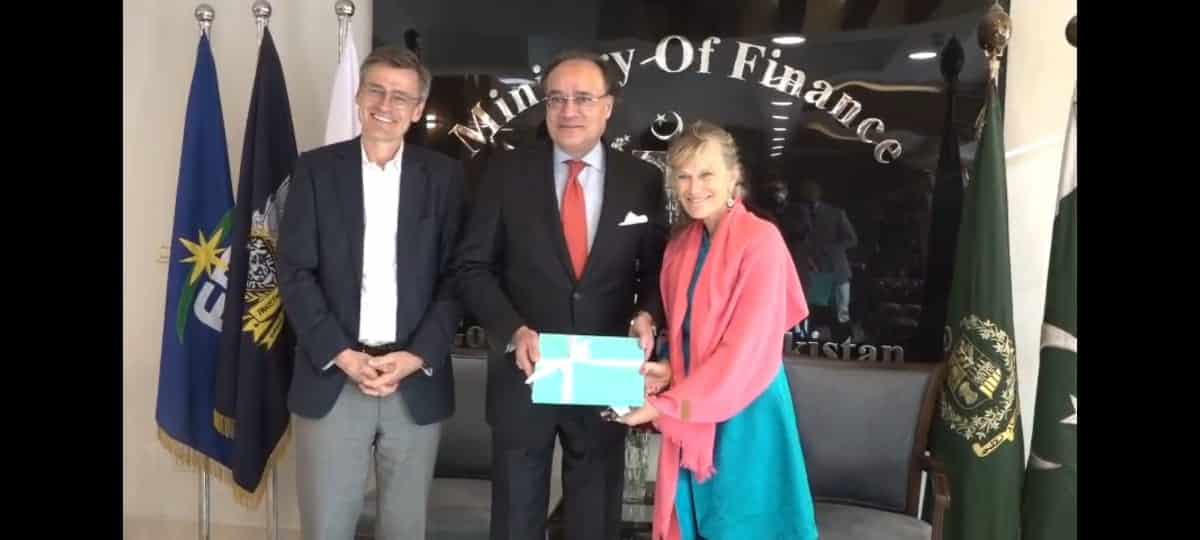With a high -level delegation of intelligence with Finance Minister Mohammed Aurangzeb, 90 million agriculture flexible funds were discussed for Pakistan, as well as investment, climate flexibility, and economic reforms.
The delegation, headed by the founder and CEO of Ecman, led by Jacqueline Novartz, included President Pool Carten Studeway, Dr. Aisha Khan, CEO of Economist Pakistan, and members of the World Board and International Investors.
Welcoming the delegation, the Finance Minister appreciated the continuous attention of the Economy on the flexibility of agriculture and climate, and noting his long -standing engagement in Pakistan.
He gave a letter to visitors to the country’s economic stability and the ongoing structural reforms in the tax and energy sectors.
Aurangzeb said that by the end of this financial year, the GDP ratio has been targeted by 11 % by the end of this fiscal through AI -led analytics and digital integration.
He also outlined the reforms that aims to reduce energy and financing costs, strengthen public partnerships, and improve investment climate.
The Finance Minister briefed Prime Minister Shahbaz Sharif about the recent visits to Beijing, Riyadh and Washington DC, where strategic partners expressed strong support for investment and trade.
He said that during the visit to China, 24 new joint ventures were signed, which reflects real progress on the investment front.
The minister also discussed business reforms in public ownership, including the privatization of PIA, the outsourcing of the Islamabad International Airport, and the privatization of the power distribution companies in the first phase.
Aurangzeb confirmed that Pakistan’s private sector would have to guide economic growth, while the role of the government is to help and help. He said that the government is moving towards a model of export growth in support of tariff reforms and responsible financial management.
The minister shared its plans even before the end of the year, after issuing Pakistan’s first Panda Bond and accessing the US dollar, euro and Islamic Sukuk markets. He added that all government payments will be digitized by the end of this financial year.
He highlighted Pakistan’s twin challenges for climate change and population growth, which emphasized decoration, children’s nutrition, girls’ education, and poverty reduction issues.
Aurangzeb said the World Bank’s country’s partnership framework provides a systematic approach to dealing with these priorities.
He also said that Pakistan has cleared back logs in the return of foreign profits, and the recent transactions – including the payment of 500 million eurobonds – is easily completed by reflecting economic stability.
Ms. Jacqueline Novogratz said that Ecman’s engagement in Pakistan is 2002 and has termed her experience “really extraordinary”. It confirmed the long -term commitment to Pakistan for Pakistan, especially in agricultural, energy and climate flexibility.
He highlighted Pakistan’s vibrant young capabilities and business capabilities, emphasizing that better access to finance can help innovators turn into an expansion business.
After this visit, Ecmany is part of a wider engagement in Islamabad, Lahore and Karachi to look for investment opportunities after the initial meeting of Ecman Pakistan in September 2025 and in the light of Pakistan’s improved economic perspective.
Thanks to Okumin for his constant confidence, Aurangzeb praised his work in allocating climate awareness, food system flexibility, and poverty.
Following a similar meeting in September 2025, after Dr. Aisha Khan (CEO and Country Head, Econom Pakistan) and his team, such a second meeting is between Ecman and Finance Minister Aurangzeb in two months.

